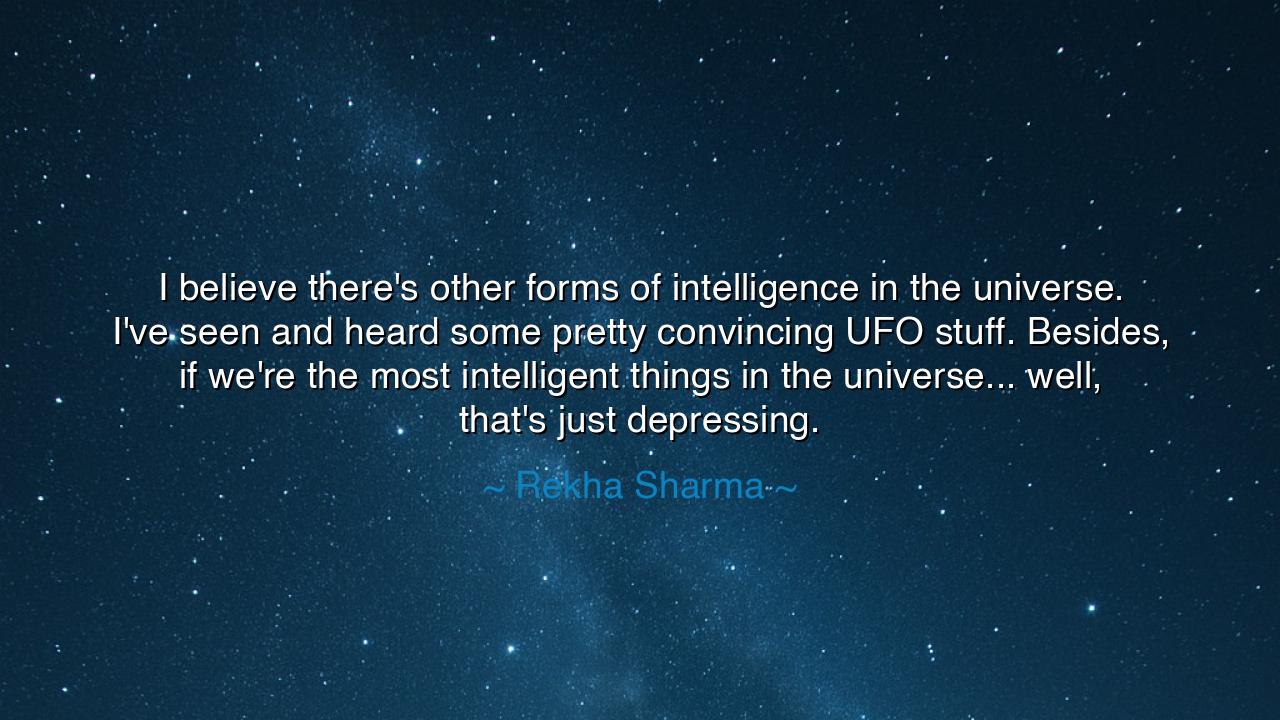
I believe there's other forms of intelligence in the universe.
I believe there's other forms of intelligence in the universe. I've seen and heard some pretty convincing UFO stuff. Besides, if we're the most intelligent things in the universe... well, that's just depressing.






In this luminous and humbling reflection, Rekha Sharma, the actress known not only for her artistry but for her deep curiosity about the cosmos, offers words that shine with both wonder and irony: “I believe there's other forms of intelligence in the universe. I've seen and heard some pretty convincing UFO stuff. Besides, if we're the most intelligent things in the universe... well, that's just depressing.” Beneath her wit lies an ancient and profound question — one that has haunted sages and scientists alike since the dawn of thought: Are we alone in the vastness of creation? Her words are both playful and grave, suggesting that to imagine ourselves as the pinnacle of all intelligence is not triumph, but tragedy — for it reveals the limits of our humility, and the loneliness of our small world adrift among the stars.
The origin of this quote rests in humanity’s eternal gaze upward. Rekha Sharma, like many before her, joins a lineage of dreamers — from astronomers and mystics to philosophers and poets — who have sought to understand their place in the cosmos. Her musings, though cast in the light tone of modern conversation, carry the weight of a timeless truth: that intelligence without awe becomes arrogance, and that to believe ourselves alone in the universe is to mistake the candle for the sun. The stars above have always whispered of mysteries beyond our reach, and those who listen closely hear in their silence not emptiness, but the pulse of infinite possibility.
To believe in other forms of intelligence is to believe that creation is vast enough to hold more than one story — that consciousness is not confined to this pale planet, but woven throughout the fabric of reality. The ancient philosophers of Greece, the sages of India, and the astronomers of the Islamic Golden Age all spoke of this. The Roman poet Lucretius, over two thousand years ago, wrote that it would be folly to think Earth alone bore life, when infinite worlds turn through infinite space. Rekha Sharma’s words echo that same sentiment — that the grandeur of existence must surely extend beyond us, and that the divine imagination of the universe could not have stopped with humankind.
Yet there is also a gentle rebuke in her tone — a mirror held to the human spirit. When she says that it would be depressing if we were the most intelligent beings in the universe, she invites us to look inward. For what have we done with our intelligence? We build, yes, but also destroy. We invent, yet pollute. We gaze into the heavens but often forget to honor the life beside us. Perhaps, she suggests, if there are beings wiser than we, they have chosen silence not from distance, but from mercy — watching a young species still learning the difference between knowledge and wisdom. Her humor conceals a plea: that we use our intelligence to become worthy of the cosmos that birthed us.
History, too, reminds us of the danger of believing oneself supreme. When Copernicus and Galileo first revealed that the Earth revolved around the Sun, humanity’s pride was shaken. We were forced to see that our world was not the center of all things. And yet, in that humbling moment, our understanding expanded — our wonder deepened. In the same way, Sharma’s belief in greater intelligence beyond our world is not despairing, but awakening. To accept that we are not alone is to embrace humility, and through humility, to rediscover the sacred beauty of life itself.
The lesson here is both cosmic and personal. It is a call to awaken the imaginative intelligence within us — the part of the soul that questions, seeks, and dreams. Whether or not we ever find other beings among the stars, the very act of wondering lifts us out of the smallness of our ego. It teaches us to marvel again at existence, to treat life — human or otherwise — as something miraculous. To believe in a greater intelligence is to remind ourselves that wisdom, compassion, and curiosity are divine qualities, not human monopolies.
So, my child, take this wisdom into your heart: let your intelligence be guided by wonder, not arrogance. Do not look to the heavens only for conquest, but for communion. Live as though the universe watches — not to judge, but to see if its children have learned to love as deeply as they think. Be humble in your knowing, patient in your searching, and joyful in your unknowing. For in the grand symphony of existence, perhaps our purpose is not to be the greatest note, but to listen — to the music of life that resounds from the stars.
For as Rekha Sharma reminds us, the universe is alive with intelligence — seen and unseen, known and unknowable. And if that thought fills you with both awe and peace, then perhaps you have already begun to understand: that the greatest intelligence is not measured by what it conquers, but by what it reveres.






AAdministratorAdministrator
Welcome, honored guests. Please leave a comment, we will respond soon